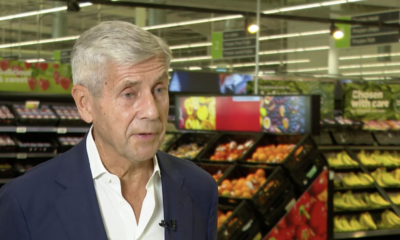Food
Concerns have been raised about fraud and security risks associated with UK import controls

The National Farmers Union (NFU) has raised concerns about Britain’s new approach to import controls.
In a letter to Sue Hayman, Parliamentary Under Secretary of State at the Department for the Environment, Food and Rural Affairs (Defra), NFU chairman Tom Bradshaw said there are widespread concerns in the sector about the way border controls have been implemented.
Bradshaw reiterated the NFU’s support for the government’s risk-based approach, but warned that reports on the reality on the ground suggest problems.
The vision of the NFU
The Border Target Operating Model (BTOM) is a new system for imports into Great Britain. The first phase came into effect in January 2024 after several delays.
The full regime will be introduced over the course of this year, with sanitary and phytosanitary (SPS) controls on medium-risk food, animal and plant products in force since April 30 and controls on live animals from the EU from the end of September will start. 2024. Goods with the highest biosecurity risk will be prioritized, with a build-up to full control rates.
“Livestock companies must be confident that border controls and controls will ensure the country’s biosecurity and food safety and that sufficient resources are being deployed to root out fraud and illegal activities where they exist. We remain concerned that our country faces greater biosecurity and food fraud risk than is necessary or acceptable,” Bradshaw said.
For horticultural businesses, the controls introduced in April have shifted checks from their businesses to Border Control Points (BCP), increasing the risks and costs for a ‘just-in-time’ supply chain.
“BCPs are seen by the industry as a point of infection risk, rather than an inspection. So far, growers have faced major delays, resulting in the destruction of young plants and plant material. Any delays implemented through the BCP could threaten business, food safety and biosecurity. Unfortunately, we are also hearing reports of shipments being damaged due to improper handling at the border,” Bradshaw said.
The letter also addressed higher charges from European carriers and other costs associated with setting up locations as checkpoints. The NFU has asked to meet Hayman to discuss members’ concerns.
Previously raised issues
At the end of July, the SPS Certification Working Group, which also includes the NFU, wrote to Steve Reed, Secretary of State for the Environment, Food and Rural Affairs.
The group of 30 organizations said they were “deeply concerned” about the threats to food safety, biosecurity and food security posed by problems with the BTOM. Members include the Chilled Food Association, the British Poultry Council, the Fresh Produce Consortium and the Provision Trade Federation.
Several topics were discussed, including insufficient separation of raw and cooked food to prevent cross-contamination, a lack of UK laboratory capacity, official availability of veterinarians and the variability in fees and limited opening hours of border crossing points.
The Dover Port Health Authority (DPHA) has previously raised concerns about the location of the BCP in Sevington, 35 kilometers from the port of entry to Great Britain. DPHA also reported that funding for controls to detect illegal meat imports and surveillance for diseases such as African swine fever has been reduced by as much as 70 percent.
The working group asked what measures had been taken to minimize risks to biosecurity and public health in the situation in Sevington. It also called the cuts “completely unacceptable.”
(To sign up for a free subscription to Food Safety News, click here.)













